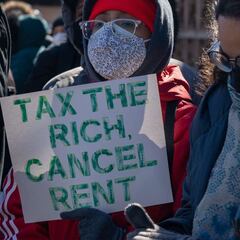Third stimulus check: is President Biden's signature necessary?
The American Rescue Plan includes a one-time $1,400 direct stimulus payment, but after Donald Trump's precedent people are asking about the name on the check.

As the House of Representatives prepares to vote on the revised American Rescue Package, people have been asking whether or not President Joe Biden will have his name signed or printed onto the individual stimulus checks that will be sent out to Americans. The simple answer to this is ‘no’.
**Follow all the latest news on the House vote now in our live blog**
Biden name will NOT be on stimulus checks
For anyone who has not been keeping a close eye on developments regarding stimulus checks over the last 12 months - when the first iteration was issued as part of the CARES Act - the reason for this question to arise came about from Biden predecessor, Donald Trump, having his name on the checks. Trump was the first president to ever do such a thing.
-
What Hoyer said about the third stimulus check and when the House will vote on the covid-19 relief bill?
-
Who could qualify for the third stimulus check?
-
How to claim a missing stimulus check on your 2020 tax return
-
Who is eligible for the unemployment benefits extension?
“I’m sure people will be very happy to get a big fat beautiful check and my name is on it," Trump confidently announced at the time, hence why White House Press Secretary Jen Psaki was fielding questions about something that would normally never make a grown-up discussion.
Psaki said on Tuesday that the President didn't think the inclusion of his signature on the checks "was a priority or a necessary step,” adding that his “focus was on getting them out as quickly as possible."
NEW: Press sec. Jen Psaki confirms stimulus check payments will not have Pres. Biden's name on them, as stimulus checks under Pres. Trump did: "This was not about him, this was about the American people getting relief." https://t.co/wb6sWr6LAx pic.twitter.com/MvZpFGF5ZW
— ABC News (@ABC) March 9, 2021
She also stated that the physical checks would be signed by a career official at the Bureau of the Fiscal Service, although they were trying to use the electronic payments wherever possible as these would reach families quicker.
"We are doing everything in our power to expedite the payments and not delay them, which is why the President's name will not appear on the memo line of this round of stimulus checks…

"This is not about him. This is about the American people getting relief..."
Jen Psaki, WH Press Secretary
“This is not about him. This is about the American people getting relief, almost 160 million of them," she said.
The vote in the lower chamber, if all goes accordingly, will be the final hurdle before the sweeping legislation lands on Biden’s desk. In the broad covid-19 relief package there are tax provisions for families in 2021 that could bring a boost to household incomes as well as the $1,400 tax rebate per person, paid in advance. These direct stimulus payments could begin showing up in bank accounts before the end of the month.
But another provision would give families further tax credit for children. Biden’s American Rescue Plan will expand the child tax credit up to $3,600 per child. Let's have a look at that in more detail.
“If I was a Democratic president, I would put my name on that check with a big hologram on it too, so it glowed when you open the envelope,” she said
— Sarah Reese Jones (@PoliticusSarah) March 10, 2021
Rachel Maddow Praises Biden For Not Plastering His Name All Over The Stimulus Checks https://t.co/N3wOZSzaPo via @politicususa
Child tax credit: what is it?
If the coronavirus relief package is approved and signed into law, families could see a substantial expansion of the child tax credit of up to $3,600 per child under 6 and $3,000 per child under 18 for 2021. The provision in the bill is temporary but the intention is to make the proposal permanent later this year.
The enhanced child credit would become fully refundable so families will receive the credit even if they paid less in taxes than the total of the credit. Furthermore, the bill calls for the IRS to pay half of the tax credit in advance to families, just like the $1,400 stimulus checks. The payments would go out monthly starting in July.
So a family could see $300 per child under 6 and $250 per child under 18 per month from July until December in 2021. The other half of the credit would be a refundable credit that taxpayers could claim on their 2021 income-tax filing in 2022.
The bill calls for the payments to be made monthly but the language allows for the Secretary of the Treasury, Janet Yellen, to determine if monthly payments are feasible for the IRS to make. The legislation also calls for the creation of an online portal for families to change their status as their financial or family situation changes. This would also allow families to opt to receive the credit in a lump sum when they file their income-tax return in 2022.
Enhanced child tax credit: who qualifies?
Related stories
The provision in the covid-19 relief bill increases the number of households that qualify for the child tax credit. The current earnings floor whereby a family must earn a minimum of $2,500 per year to even qualify for the child tax credit would be removed for 2021.
"Social security for kids:" @chrislhayes on the historic child credit in the Covid relief bill. https://t.co/kA50Fh6LDS
— All In with Chris Hayes (@allinwithchris) March 10, 2021
The bill would set a cap to receive the maximum amount at $75,000 annual adjusted gross income (AGI) for individual taxpayers, $150,000 for joint filers and $112,500 for head of household. Above that threshold the benefit would phase out incrementally. After the phase out point for the enhanced child tax credit, the current child tax credit of $2,000 would apply with the size of the benefit starting to phase out for individual taxpayers with an annual AGI over $200,000, for joint filers AGI over $400,000.
- Social support
- United States
- Pandemic
- Coronavirus
- Recession
- North America
- Parliament
- Infectious diseases
- Virology
- Outbreak
- Joseph Biden
- Economic climate
- Diseases
- Microbiology
- Social policy
- America
- Medicine
- Politics
- Biology
- Health
- Society
- Coronavirus stimulus checks
- Life sciences
- USA coronavirus stimulus checks
- Covid-19 economic crisis
- Child benefits
- Science
- United States Congress
- Coronavirus Covid-19
- Economic crisis

